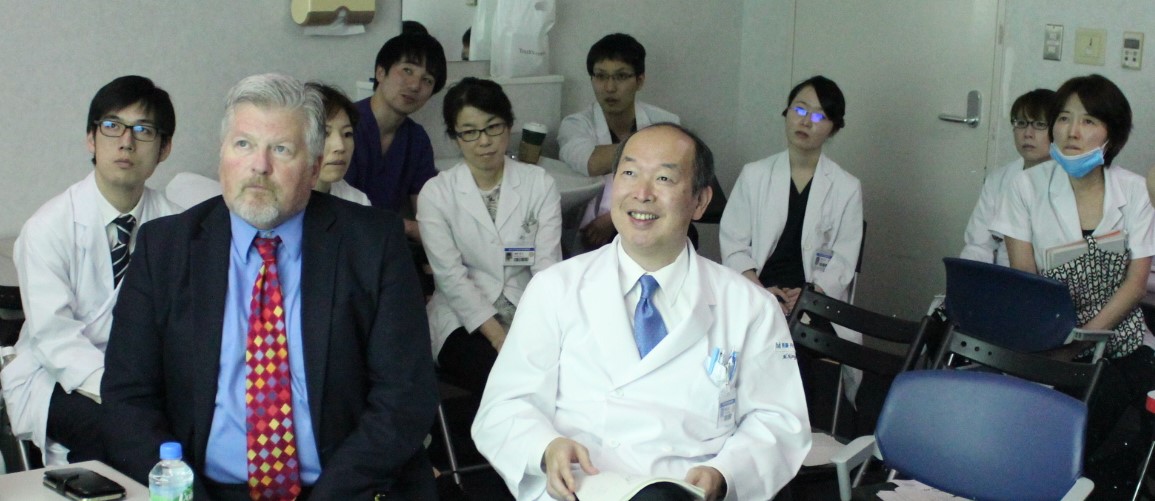
The Department of Nephrology and Endocrinology provides care for kidney diseases, diseases caused by excessive or insufficient hormone actions, endocrine tumors and hypertension, which is closely related to problems with both the kidneys and endocrine system.
Medical services
Board-certified specialists in kidney and endocrine diseases evaluate and treat both outpatients and inpatients. The division also provides outpatient care specializing in hypertension and inpatient programs which include evaluation of and education about hypertension. Each patient referred to us is treated by the same physician to ensure the consistent and appropriate care. We are collaborating with regional clinics, depending on patients’ medical condition.
Diagnosis and treatment policy
The treatment of each patient is discussed during the weekly rounds led by the head of the division and including all full-time assistants and senior attending physicians. In addition, a group of specialists performs detailed assessment of individual cases. For particularly complicated cases, a case review meeting is convened which includes specialists invited from other departments and external institutions.
Specialties
Kidney failure
Treatment for kidney failure is provided (e.g. hemodialysis for patients with acute and chronic kidney failure; outpatient support services for those receiving home peritoneal dialysis) in cooperation with the Department of Hemodialysis and Apheresis.
Hormone abnormalities
Hormones are produced by various glands, such as the pituitary gland, thyroid gland, parathyroid glands, adrenal glands and gonads, to maintain homeostasis. Abnormal hormone functions manifest themselves in a variety of ways. We perform examinations to identify causes of these abnormalities so as to provide the most appropriate treatment.
Hypertension
We provide the most appropriate treatment for each patient with hypertension to prevent systemic organ dysfunction. Emphasis is also placed on testing and treatment for secondary hypertension caused by adrenal tumors and other diseases.
Target diseases
Acute kidney injury, chronic kidney disease, kidney failure, glomerulonephritis, lgA nephropathy, nephrotic syndrome, electrolyte abnormalities, hypertension, hyperthyroidism, hypothyroidism, hyperparathyroidism, hypoparathyroidism, diabetes insipidus, syndrome of inappropriate secretion of ADH, acromegaly, Cushing’s syndrome, adrenal insufficiency, pheochromocytoma, primary aldosteronism, gonadal failure, disorders of calcium metabolism, osteoporosis, osteomalacia.
Advanced treatments/ Specialized treatments
Home peritoneal dialysis
Peritoneal dialysis can be performed at home. Such patients receive specialist back-up on an outpatient basis.
Diagnosis and treatment for atypical HUS
Frequently performed tests and descriptions
Outpatients
- Abdominal (kidney) ultrasound examination
- Thyroid/parathyroid ultrasound examination
- Thyroid aspiration biopsy
- Bone densitometry
Inpatients
- Renal biopsy/endocrine diagnostic tests
- 24 hour blood pressure monitoring
- Adrenal venous sampling
Departments/Divisions
Division of Nephrology and Endocrinology, Department of Hemodialysis and Apheresis
Titles
M.D. , Ph.D.
Expertise/Specialties
Chronic kidney disease, Diabetic kidney disease, End stage kidney disease, Hemodialysis, Nephrotic syndrome, Anemia in CKD
Research Interests
Oxygen metabolism of the kidney, immunological kidney injury, epigenetics, renal anemia
Languages
Japanese/English
See More
Major diseases and numbers of inpatients treated
|
[Nephrology] |
Number of inpatients |
| 1 |
Hemodialysis and related complications |
127 |
| 4 |
Kidney transplant and complications after kidney transplantation |
20 |
| 5 |
Chronic renal failure |
170 |
| 6 |
Acute kidney injury (AKI) |
31 |
| 8 |
Chronic glomerulonephritis (CGN) |
28 |
| 9 |
Rapidly progressive glomerulonephritis (RPGN) |
27 |
|
Total number in the Department of Nephrology |
443 |
|
[Endocrinology] |
Number of inpatients |
| 1 |
Primary aldosteronism |
38 |
| 4 |
Primary hyperparathyroidism |
15 |
| 5 |
Pheochromocytoma and paraganglioma |
13 |
|
Total number in the Department of Endocrinology |
233 |
Areas of expertise, treatment and examination methods
Diseases
- Chronic renal disease and failure
- Hypertension
- Hyperthyroidism
- Acute renal failure
- Adrenal tumor
- Thyroid tumor
- Chronic nephritis
Treatment methods
- Home peritoneal dialysis
- Preventive approaches and educational hospitalization for patients with chronic renal failure
- Educational hospitalization for patients with hypertension
- Internal radiotherapy for hyperthyroidism
Examination methods
- Renal biopsy
- Endocrine function test
- Thyroid ultrasonography
- Adrenal vein sampling
- Puncture-aspiration cytodiagnosis
Numbers of major operations and treatments performed in this department
|
Name of operation/treatment |
Number |
| 1 |
Percutaneous transluminal angioplasty(PTA) |
47 |
| 2 |
Isotope therapy for Basedow's disease |
5 |
| 3 |
Peritoneal dialysis catheter placement |
5 |
Numbers of major and specialized examinations conducted in this department
|
Name of examination |
Name of examination |
| 2 |
Thyroid and parathyroid ultrasonography |
946 |
| 3 |
Thyroid aspiration cytodiagnosis |
65 |
| 4 |
Adrenal vein sampling |
7 |


